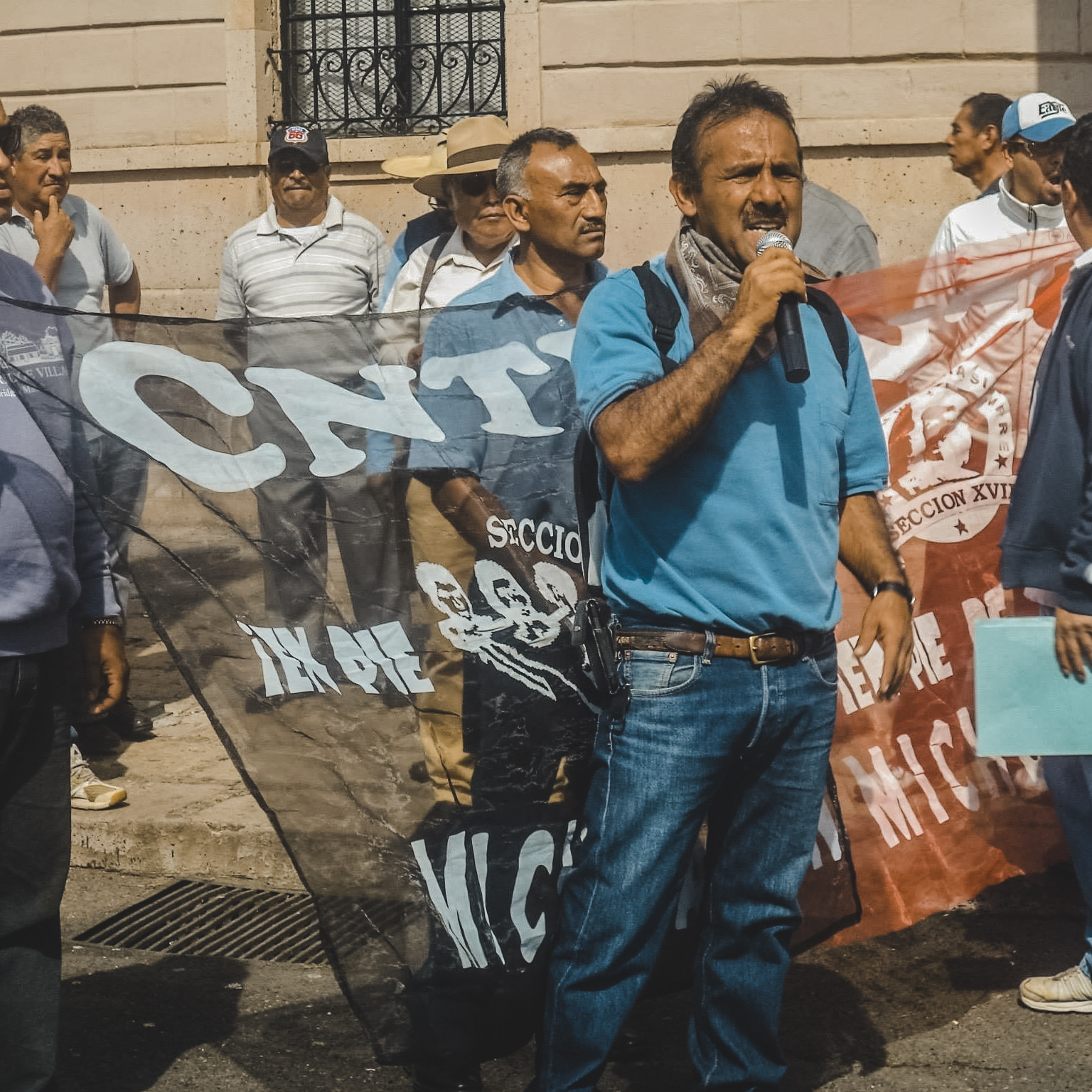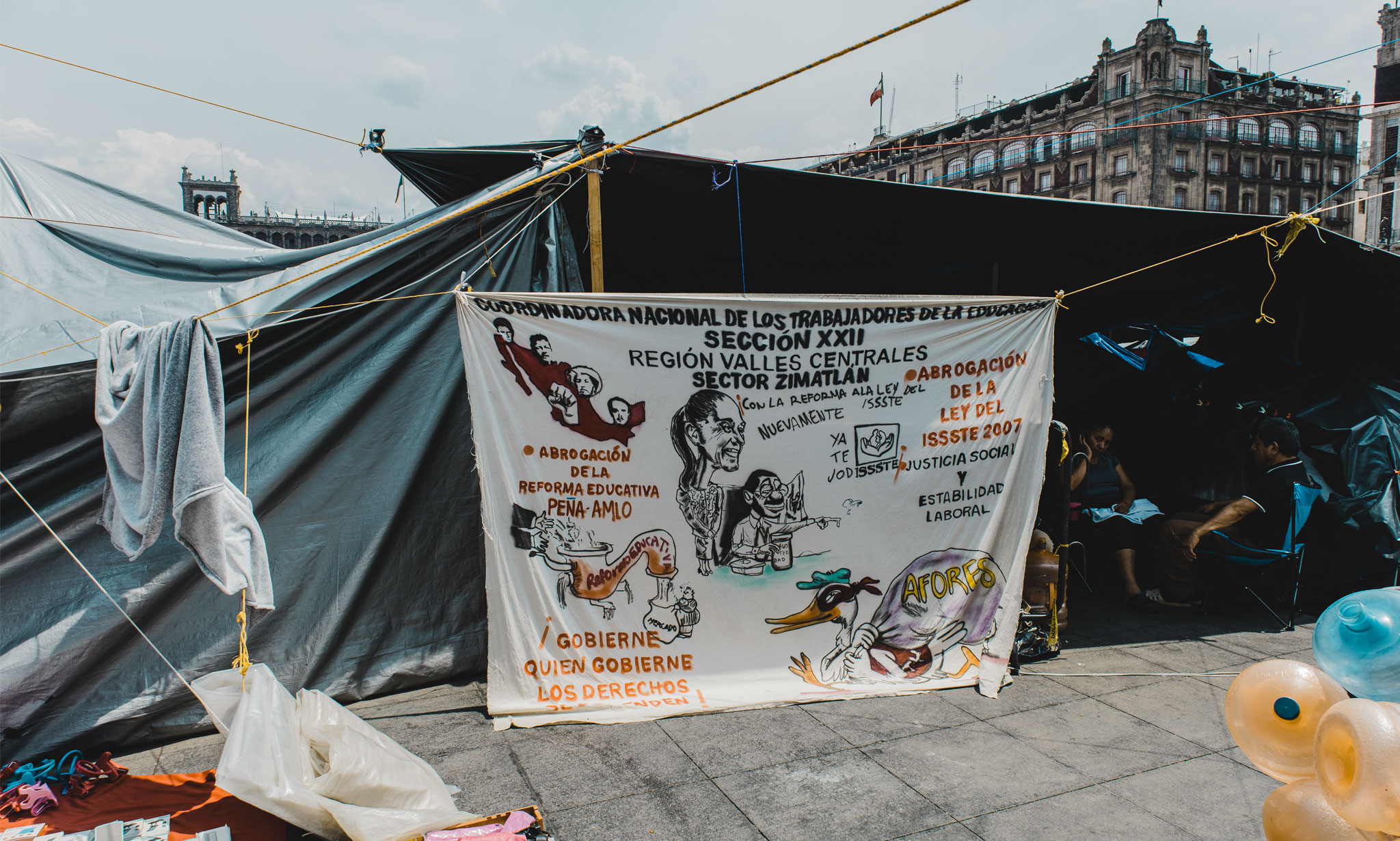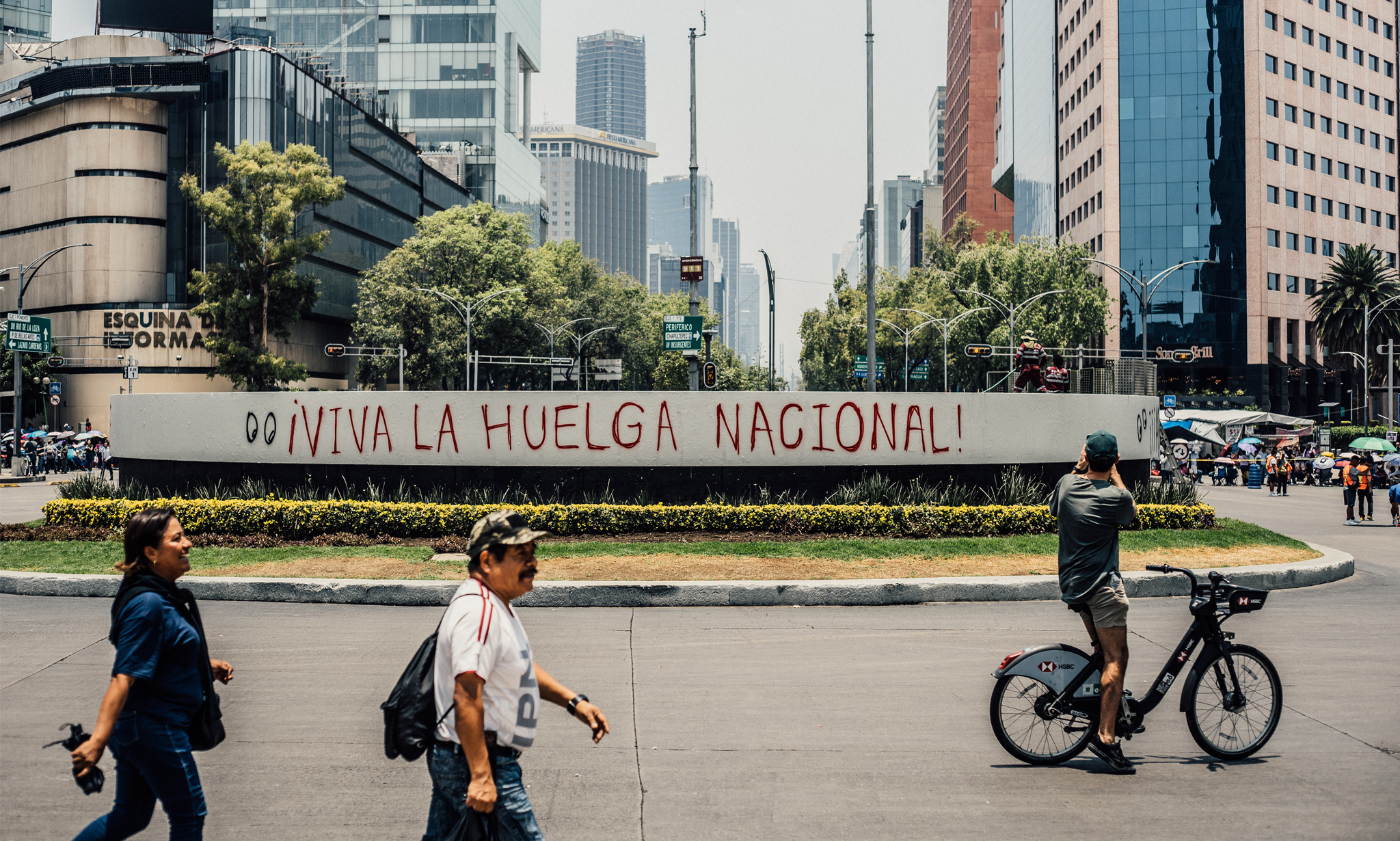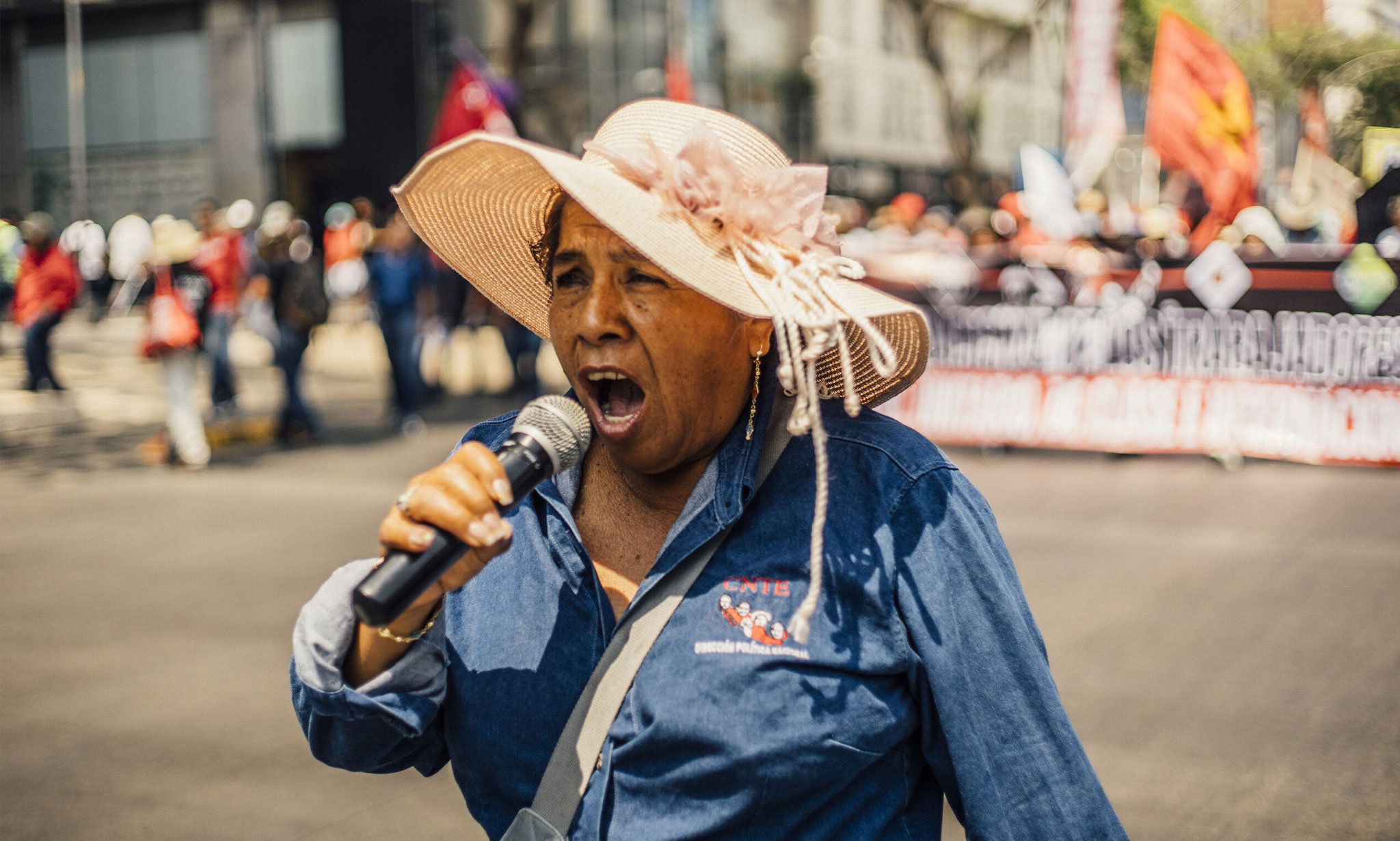Morena Disappoints: Teachers Get No Security
This interview originally appeared in the Mexico Solidarity Bulletin, the weekly newsletter of the Mexico Solidarity Project. We encourage you to subscribe.
“There are no lifeboats. Every man and woman for themselves!” Not words you want to hear as the ship is sinking.
And not what you want to hear as you get older, when ordinary tasks become more difficult, and you don’t have the luxury of taking risks. But that’s the message we’ve been sent by neoliberal politicians. In the US and in Mexico, the neoliberals have tried with varying success to discontinue socialized old age pensions and Medicare health insurance and replace them with individual retirement and health savings accounts.
To add insult to injury, we are told this is for our own good — it’s freedom! That is, if you think freedom means being subject to the whims of the stock market, freedom to be exploited by private banks and financial advisors. They use your money to invest, and whether you gain or lose, they get their hefty fees. You take the risk; they never fail to profit.
In Mexico, President Lopez Obrador and the Morena party named neoliberalism as corruption, where the wealthy got richer at the expense of the poor, and they promised to reverse that equation. The Mexican people rejoiced when energy was re-nationalized and they could count on stable gas prices at the pump.
But the transformation is not completed. Neither AMLO nor President Sheinbaum has reversed the privatization of the retirement system. While the poorest have benefited from expanding social welfare programs, teachers remain on a treadmill, going nowhere. The failure is not only economic — one-size-fits-all education policies have eroded teacher job security and the freedom to adapt teaching to the needs of diverse student populations.
The radical teachers union, the CNTE, thinks they’ve waited long enough. They should not be told to sink or swim. Send the lifeboats!

A longtime primary school teacher, Eligio Valdes now serves as the principal of the Ruben Jaramillo school. For 10 years, he led the CNTE section in Morelia, Michoacan, and he now serves as the General Coordinator of CNTE for the entire state of Michoacan, a CNTE stronghold. Eligio was a leader of the recent strike, which unfortunately ended without resolution of the union’s important issues. They are already in the process of rebuilding.
The CNTE has been a driving force behind improvements in teachers’ lives. What have you achieved over the years?
In my opinion, our most important achievement is becoming a large and democratic union of education workers that has remained active for decades.
Despite internal difficulties, murders, disappearances, imprisonments and physical and administrative repression, we remain both a fundamental reference point for developing alternative teaching methods and an example of popular and class struggle.
For example, we obtained salary increases and bonuses for teachers. Second, we not only raised money for students to cover school supplies and other expenses but also provided them with bicycles. For their families, we provided agricultural tools and fertilizer.
Third, we secured government funding for our alternative schools. Teachers use Paolo Freire’s popular education methods as well as indigenous practices. Over the years, we have engaged in militant protests to pressure governments and achieve our goals.

In May 2025, the CNTE education workers went on strike. The workers came from several states and set up shop in Mexico City’s Zócalo. What were they demanding, and why was the strike necessary?
We made three fundamental demands. First, repeal of the neoliberal restructuring of the retirement and pension system implemented in 2007.
Instead of combining public sector employee pensions into a large public fund that everyone could access upon retirement, the restructuring forced us to create individual retirement accounts managed by private financial groups that profit by investing our money.
This enriched the corporate sector with worker savings and left us facing a miserable old age. When she ran for president, President Sheinbaum promised to repeal the 2007 privatization of pensions, but she failed to keep her promise.
Second, we demand the repeal of the neoliberal education reform, which commodified education, subjecting it to the dictates of international organizations while affecting the administrative labor rights of education workers. For example, previously, graduating from a teacher training college guaranteed a job, but with the reform, teachers now have to pass another exam. But exam results aren’t published, meaning that hiring is decided through nepotism.
Third, we demand a 100% salary increase. During AMLO’s administration, our salaries barely kept up with inflation. Our protest was motivated by the president’s unfulfilled promises and to make our voices heard in the search for solutions.

The CNTE wanted to negotiate changes, but the SNTE, PRI’s charro union, officially represents the teachers at the national level. Did the CNTE have the right to negotiate?
We didn’t ask to negotiate. We used a petition. Petitioning is an unrestricted constitutional right, and we, as workers, have never renounced it. Furthermore, given the silence of the charros, including the SNTE, which didn’t even ask for negotiations and allied itself with government policies harmful to workers, we had to establish our own platforms and struggle tactics to achieve our goals.
Militant protests — education workers occupied Mexico City’s Zócalo for 23 days, from May 15 to June 7. Several violent incidents occurred — harassment of journalists, looting of an SNTE office, and breaking down doors. Did the CNTE use violence as a tactic?
All social movements are infiltrated by the government, and these infiltrators then create scenarios that the government and its media spokespeople exploit to discredit the movements in the public eye. In the case of the damaged SNTE building, the building belongs to all of us who work in education, and we determine what to do with it. Violence has never been the tactic of anyone or any group within the CNTE; on the contrary, we have suffered all types of violence from the State and its institutions, especially the police.
The CNTE’s relationship with the Morena government seems the same as with the PRI governments. Did the fact that Mexico has a government that proclaims itself progressive affect its stance and negotiating tactics?
It’s worth mentioning that all governments are the same and have the same practices, even if they try to disguise them with nuanced speeches, programs or campaigns. Morena has a significant problem. Despite the high acceptance it still enjoys among the population, it has weakened social movements by co-opting leaders who stood out in the struggle.
This has led to demobilization, and it continues to deepen the current disunity in some CNTE sections.
It was reported that President Sheinbaum granted teachers a 9% salary increase, not through negotiations or petitions, but simply through an announcement. In reality, it was only 4%, because the remaining 5% was allocated to other benefits.

The strike is over. What’s next for the CNTE?
We’re holding meetings to evaluate the strike, the days of struggle and the need for reorganization. We have called upon the federal government to address and resolve our general demands. If it turns a deaf ear, we’ll resume the mobilizations, and we’ll expand efforts to include other sectors of workers also hurt by neoliberal reforms. These reforms, underway since 1982, intensified during Carlos Salinas’s six-year term and have continued through the most recent governments that falsely proclaim themselves as leftist.
The case of my state, Michoacán, deserves special attention; it is experiencing a deep crisis due to multiple divisions within the CNTE. Our task is to rebuild and reorganize in order to regain our unity and distinguish ourselves as a powerful, combative, determined and consistent CNTE section. Doing so will prevent us from appearing again on the national stage in a weakened and pitiful role, to put it mildly.
-
People’s Mañanera February 9
President Sheinbaum’s daily press conference, with comments on scholarships, return of mining concessions, PRIAN exposed, Bad Bunny Super Bowl, and aid to Cuba.
-
8 Million App Users, TV Soap Opera Ad… & the PAN Still Can’t Find New Members
In Mexico, where political parties are currently publicly financed, the right wing PAN has spent a staggering amount during its lackluster recruitment drive.
-
Mexico’s National Film Archives Workers Demand Dignity
“Our struggle is legitimate; we are not asking for privileges or luxuries, only better working conditions and job security. We also seek dialogue. This situation has become unsustainable.”




